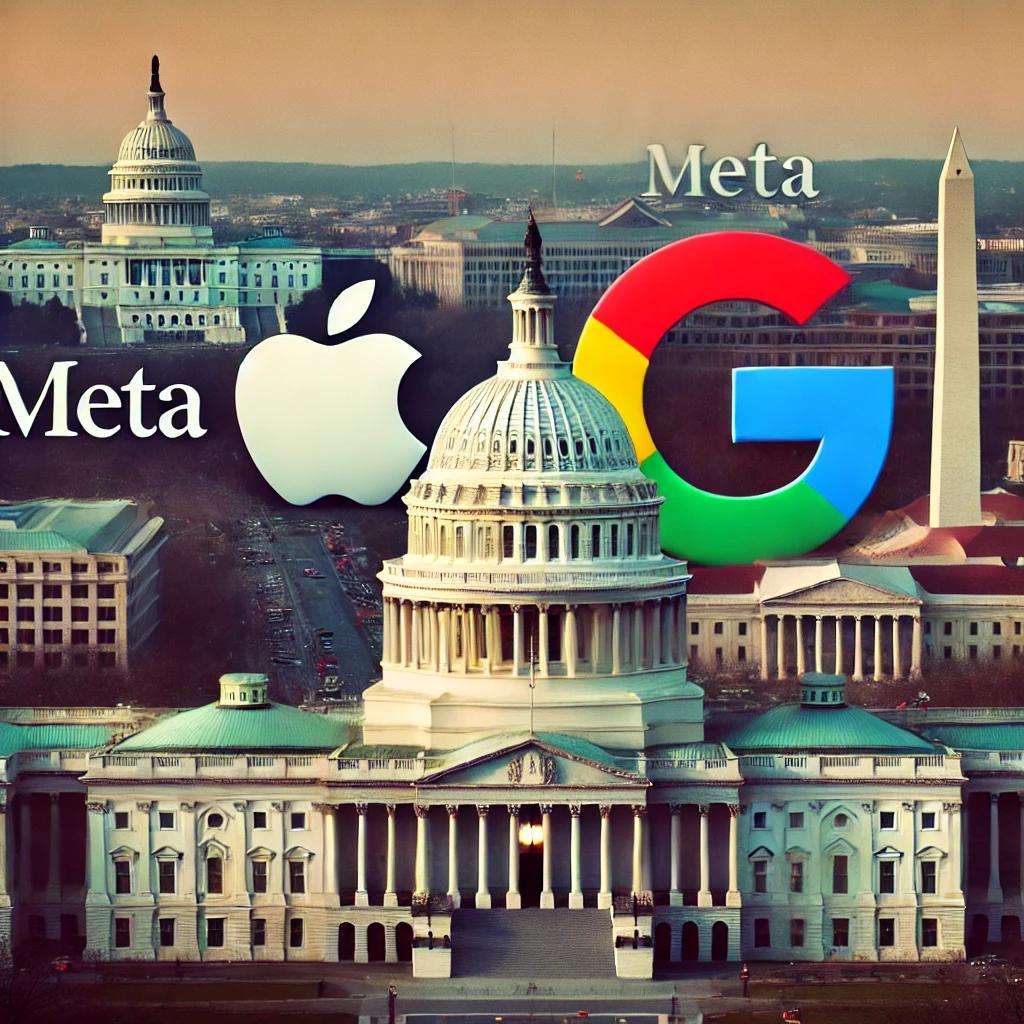With Donald Trump re-elected as President, the tech industry finds itself at a pivotal moment. During his previous term, Trump’s administration introduced regulations aimed at reining in the power of big tech companies like Facebook, Google, and Amazon, while also fostering a “Made in America” sentiment that influenced the tech supply chain. With his return, the industry is bracing for fresh scrutiny and a series of new challenges and opportunities. Here’s a closer look at what lies ahead for tech giants as they navigate this evolving landscape.
1. Stricter Regulatory Oversight on Big Tech
A core component of Trump’s policy agenda for tech will likely involve increased regulation to curb the influence of big tech companies. During his previous term, we saw the beginning of anti-trust investigations and heightened scrutiny on companies that hold monopolistic control over digital services and data.
The Trump administration took a firm stance on what it viewed as “censorship” by social media platforms, pushing back against their policies on moderating content. This pressure may only increase now, with the potential for new regulations that require transparency in content moderation and reduce perceived biases. Companies like Meta (Facebook), X (formerly Twitter), and Google may face specific challenges in adapting to these requirements while maintaining their operations.
For tech giants, navigating stricter regulations may involve lobbying efforts, strategic partnerships, and adapting business models to fit into a new regulatory framework. There is also the possibility of mandated transparency reports, fines for non-compliance, and even data privacy requirements that closely resemble the European Union’s General Data Protection Regulation (GDPR).
2. Potential Shifts in International Trade and Supply Chains
Trump’s “America First” approach to trade policies could significantly impact tech companies reliant on global supply chains. In his previous term, tariffs on Chinese imports, including many tech components, drove up costs and spurred some companies to rethink their supply chains. If Trump continues along this trajectory, companies may see further disruption or face higher costs, impacting consumer prices and the ability to quickly roll out new products.
The new administration may encourage a shift towards domestic manufacturing, with incentives to bring production back to the U.S. Apple, which relies heavily on Asian manufacturing, could face pressure to relocate its operations stateside. While this shift could create jobs, it might also lead to increased expenses that tech companies may pass on to consumers. Additionally, new tariffs and trade policies with China could impact semiconductor supply, leading to a potential slowdown in production for companies like Intel and Nvidia.
3. A New Era of Innovation and Artificial Intelligence (AI)
Trump’s administration may focus on advancing American leadership in artificial intelligence (AI) and machine learning as key competitive advantages. To this end, Trump could advocate for substantial investments in AI research and development, particularly as countries like China race to dominate the AI landscape. His administration’s support could result in funding for public and private collaborations, increased STEM education, and regulatory flexibility, allowing tech companies to innovate freely within AI and related fields.
For Silicon Valley, this focus on AI could translate into more investment opportunities, particularly in areas like autonomous driving, natural language processing, and cybersecurity. Yet, as AI technologies raise ethical questions and potential risks, tech companies may also face new oversight mechanisms designed to ensure the responsible development and deployment of these technologies.

4. Data Privacy and Security Concerns
Data privacy and cybersecurity remain at the forefront of discussions on tech regulation, especially as cyber threats grow more sophisticated. During his previous term, Trump signed several executive orders aimed at increasing cybersecurity measures across the government. For tech companies, this renewed focus could lead to stricter standards on data security, especially for companies that handle sensitive consumer information.
With his re-election, it’s possible that Trump will push for federal legislation that outlines clear standards on data collection, storage, and protection, potentially mirroring Europe’s GDPR. For tech companies, this could mean increased accountability and more rigorous reporting requirements on data handling practices. Furthermore, consumers are becoming increasingly aware of data privacy concerns, putting pressure on companies to adopt transparent and ethical data practices.
5. Tax Policy Changes and Their Impact on Innovation
One of Trump’s notable achievements during his last term was the Tax Cuts and Jobs Act of 2017, which lowered corporate tax rates. A similar approach could encourage tech companies to reinvest profits in innovation and infrastructure. However, a more complex tax policy might also incentivize domestic investment over overseas operations, pressuring tech firms to rethink international expansion strategies.
On the flip side, Trump’s focus on reducing federal income tax revenue could put pressure on other revenue sources, which might indirectly increase the tax burden on tech firms that operate globally. For companies, these policies may necessitate strategic adjustments in terms of where they allocate resources, conduct research, and hire new talent.
6. The Impact on Social Media and Free Speech
Social media platforms, particularly X (Twitter), Meta, and YouTube, have frequently been at the center of debates over free speech and content moderation. Trump’s return could reignite these discussions, with potential attempts to limit perceived biases in content moderation.
Under his administration, tech companies might see attempts to introduce Section 230 reforms, which shield platforms from liability for user-generated content but have faced criticism for allegedly enabling censorship. Changing Section 230 could drastically impact how platforms operate, potentially exposing them to lawsuits for moderating content. For users, this could mean changes to platform policies and increased scrutiny over what constitutes acceptable online speech.
Conclusion: Navigating the New Era of Tech Policy
Donald Trump’s re-election marks the beginning of a transformative period for the tech industry. Tech giants face a dual challenge: adapting to stricter regulations while seizing new opportunities in areas like AI and data privacy. While the exact trajectory of these changes remains to be seen, one thing is clear—companies must be ready to adapt and innovate.
The road ahead for tech companies will be marked by a need to align business practices with shifting policies, balance consumer expectations with new regulations, and keep pace with the technological advancements that continue to define the digital age. As the Trump administration redefines its stance on technology and its role in the economy, the next four years promise to be a dynamic era in which big tech must remain agile, resilient, and responsive.

Sources:
This is a defining time for tech companies, and the policies and strategies that emerge now will shape the future of technology as it evolves within the framework of political influence and market demand.

